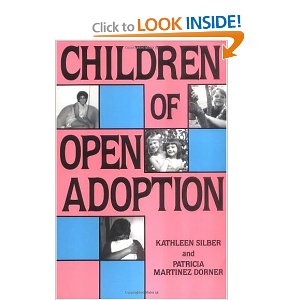 |
| Image credit: Amazon.com |
Since I'm in an open adoption with my daughter and her parents, I came into reading this book with the hope that it would offer practical advice or insights in dealing with the complexities of open adoption. It didn't. What it did offer was reasonable explanations and insights from real adoptions as to the benefits of having an open adoption.
I thoroughly enjoyed the tidbits of stories shared, and a few of them even brought me to tears. One of my favorite insights by a birthmom shared early on in the book was the following: "When I see her, I don't want her back. I would never go steal her away because I know where she is. It's a good feeling to see them and know she's okay [talking about her birthdaughter]." It is my hope that if potential adoptive parents (or even adoptive parents who are reluctant to facilitate or continue contact with their child's birthparents) read statements like this that they'll realize that the intent of the birthparent is not to damage the bonds that the adoptive parent creates with their child. We only want to have a bond of our own.
This book doesn't address many birth parent issues directly. In fact, it doesn't address at all when adoptive parents break promises of contact that the birth parents want to continue, it just talks about the importance of adoptive parents continuing to try to make contact when the birth parents (or the birthmother in specific) breaks contact for whatever reason. It does devote several paragraphs to the positivity that many birthmothers actually experience when they keep up some sort of contact (cards/letters, phone calls, or even visits) with their children. "Birthparents report that when emotionally dealing with their adoption decision, they sometimes remain in a state of numbness - intertwined with grief and guilt. ....When no contact is available, birthparents are more likely to fixate on [these] issues, attacking their self-esteem and not progressing in the working through of the separation from their child." I thought these sentences were particularly poignant as I know more than one birthmother who has been denied contact with her child, and I've seen what it does to them emotionally. It is my hope that when adoptive parents read this book that they'll get insight into what it truly feels like to be a birthmother denied even the smallest of accesses to her child.
My favorite part of the book was a small section toward the end that addressed the discomfort of adoptive grandparents toward open adoption in general and told the stories of a couple of those grandparents that had come to terms with the decision that their children made to have open adoption with their child's birthparents. This was particularly applicable to me as I know that both sets of my daughter's grandparents (with whom her parents have extremely close relationships) have expressed reluctance to support T & C's decision to have an open adoption with Nick and me.
All in all, this book was a good first foray into the "world" of adoption books. I would consider it a great read for potential adoptive parents as well as adoptive parents already in the process of rearing their children, even those who may already be in various stages of openness with their child's birthmother.
What about you? Have you read any adoption-related books that you think I should add to my growing list and then review here?


Thank you for this book review and lovely post. I am an adoptive mom with a wonderful, open relationship with my daughter's birth mom. I also have this book and will make a point of reading it!
ReplyDelete